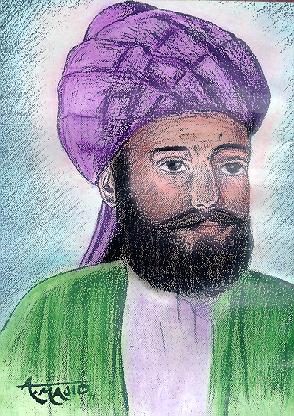

by
Shaykh Mohd. Iqbal. Karachi (Pakistan)
"Abdul Malik-i Attash was a refined literary personality, had beautiful handwriting, a quick wit and a gentle disposition but was absorbed in his love for Ismailism" (1).
In the above quoted words lbn al-Athir pays his tributes to Abdul Malik bin Attash, who was a great Da'i of Ismaili Dawa in lsfahan.
As for the date of his birth and childhood we do not know much, except that he was in charge of Ismaili Da'wat in Fars specially in lsfahan in the reign of lmam Mustansir billah (427/1036 to 487/1094). He was a very learned man. lmam of the time had put many Da'is for example Da'i Abu Najam Siraj and Abu Mumin under him. who were doing the Da'wat in the various provinces of Iran. Sayyidna Hasan bin Sabbah had also embraced Ismailism by the endeavours of these Da'is. Abdul Malik bin Attash was a very perceptive man, so when Sayyidna Hasan met him, he at once knew, that Hasan was a man of qualities and possessed a good knowledge of sciences. He was impressed with his piety, devotion and sincerity and became aware of his abilities, intelligence and patriotism for the Ismaili Madhhab. So he appointed him as his agent and gave him a post in the Da'wa after training him in its techniques. Hasan worked on this post as his assistant for two years in lsfahan and then Abdul Malik asked him to go to Egypt and establish contact with the chief da'i there, so that he may learn the divine principles and the doctrines of the Da'wa from its original and pure source because Egypt at that time was the Chief Centre for the Da'is.
The afore-mentioned quotation from lbn al-Athir and the activities of the Ismaili Da'i under Abdul Malik bin Attash lead us to think that he was a great scholar and learned man. So from this we can infer that he might have written some books about his activities for spreading Ismaili Da'wa and on the Da'wa itself. But unfortunately these books have not reached us. Though at present we do not have any of his literary work in our hands, but there is no doubt in his scholarship. And for this he was respected not only by the Ismailis but also by the whole of the Muslim world. As the writer of the Cambridge History of Iran gives us this information, in these words:
"Abdul Malik-i-Attash was respected for his scholarship even in Sunni circles and seems to have been a focus of widespread renewed activity in the Saljuq dominions(2).
Ibn-Attash was a great diplomat and an expert in the tactics of Da'wa and in winning over the hearts of people to his faith. Moreover, he was a brave, courageous and a great military leader. (3) In spite of the strong power of the Saljuqi Sultans, he captured many important places in Adharbayjan and Syria in the days of H. lmam Mustansir billah. Later on in the early years of the sixth century his Da'is took possession of a number of castles in Syria, among them were al-Qadmus and Banyas and in Persia Shirkuh, Qain and others.
Saljuqi Sultans were always trying to take these fortresses back from the Ismailis. Even Malik Shah who died in 485/1092, had sent his armies many times against them, but all in vain. After his death, a civil war started amongst his sons, so Abdul Malik got a good chance and in 488 A.H. he seized the castle of al-Firdous (in Quhistan) during the reign of Berkyaruq (d. 1105), where he founded a school for the Ismailis in which more than 30,000 people were trained. This castle was built by one of the Saljuq Sultans, that is why it was also given the name of Shahdur or Shahdiz, which means the fortress of the king and this fortress remained in the possession of Dai Abdul Malik for nearly 12 years i.e. from 488 to 500 A.H.
When Sultan Muhammad bin Malik Shah came to power after Berkyaruq, he started fighting with the Ismailis by attacking the fortress of Shahdur in 500/1107 C.E. He himself was the commander of that large army. At that time Ismailis were only 80, but they fought bravely. lbn-Attash tried to conclude a truce with the Saljuqi Sultan and settle all the problems peacefully, but he did not succeed and Saljuqi Sultan continued the fighting. After a magnificent defence lbn-Attash was overpowered by the armies of the Sultan and taken prisoner. He was paraded in Isfahan and then skinned alive till he died. His son was killed and his wife threw herself from the fortress and died.
Thus the death of Abdul-Malik-bin-Attash took place in 500 A.H./1107 C.E. Hasan bin Sabbah who was in charge of the entire Da'wat then onwards made Alamut the headquarters of the Ismaili community.
1. Ibn-Athir vol. 10 cf. Jawad al-Mascati "Hassan bin Sabbah" pg. 68
2. Cambridge history of Iran vol. 5 ghap. 5 'Ismaili state' by M.G.S. Hodgson pg. 428.
3. "Jannal al-Amal, translated by Dr. N. A. Mirza from Arabic
![]() Back
to Ismaili Heroes
Back
to Ismaili Heroes
![]() Back
to Ismaili Web
Back
to Ismaili Web
![]() Sign
our Guestbook
Sign
our Guestbook